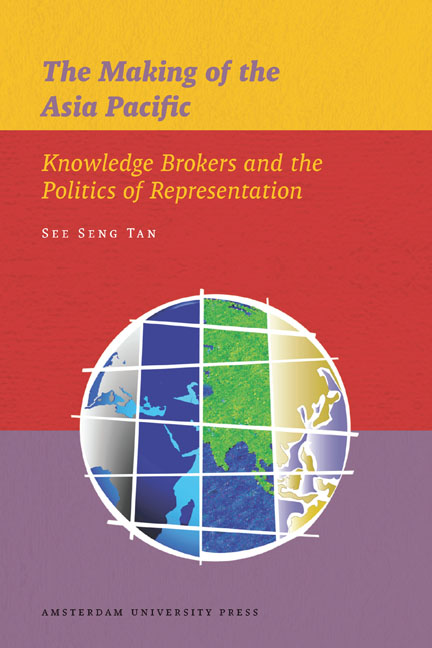Book contents
- Frontmatter
- Dedication
- Contents
- List of Tables
- Acknowledgements
- 1 Introduction: From ‘Pacific Asia’ to ‘Asia Pacific’
- 2 The Desire for Essence
- 3 Knowledge Networks as Agents of Representation
- 4 Representing the ‘Asia Pacific’
- 5 Representing Sovereign States
- 6 Representing the ‘In/Human’ Faces of Asia Pacific Security
- 7 Representing the ‘Authority’ of Knowledge Networks
- 8 Conclusion: A Plea in Three Parts
- Notes
- Bibliography
- Index
- Miscellaneous Ensmatter
5 - Representing Sovereign States
Published online by Cambridge University Press: 10 December 2020
- Frontmatter
- Dedication
- Contents
- List of Tables
- Acknowledgements
- 1 Introduction: From ‘Pacific Asia’ to ‘Asia Pacific’
- 2 The Desire for Essence
- 3 Knowledge Networks as Agents of Representation
- 4 Representing the ‘Asia Pacific’
- 5 Representing Sovereign States
- 6 Representing the ‘In/Human’ Faces of Asia Pacific Security
- 7 Representing the ‘Authority’ of Knowledge Networks
- 8 Conclusion: A Plea in Three Parts
- Notes
- Bibliography
- Index
- Miscellaneous Ensmatter
Summary
If the sovereign state is to be an institution of material significance, this effect must be reliably and repeatedly produced in space and time, but the successful reproduction of this effect requires the problem itself never be explicitly posed, represented, or made visible in any other way. For the visibility of the problem is tantamount to the recognition that domestic authority, far from being a self-evident presence that might be represented in institutions of state, is itself a problematical institution that is produced through arbitrary practices … Practices of statecraft, to be effective, must proceed as if this source of authority is always there to be found and represented. (Ashley undated: 5, emphasis added)
What I seek to do in this chapter is, as the fashionable expression goes, to ‘interrogate’ the tenuous construction and stabilisation of Asia Pacific state-oriented subjectivities. Subversive effects wrought by the forces of globalisation and transnationalism in late capitalism have complicated, possibly even undermined, the discursive formations that enable the sovereign state, thereby denaturalising a subjectivity that hitherto seemed familiar and self-evident to us. Stated differently, in the face of competing discourses, the capacity of discursive utterances regarding the state to conceal its ‘founding’ conditions has diminished. This study treats discourse as a reiterative and referential practice by which it – and the subjects who engage in and are constituted by it – produces the effects that it names. If so, then the sovereign states of the Asia Pacific region are not pre-established social facts whose materiality is independent of the discursive statecraft that go into their making. Hence ‘America’ and ‘China’, or ‘Indonesia’ and ‘Vietnam’ can all be understood as contested identities and subjectivities that must continually preserve the self-imposed limits (or boundaries) by which they are affirmed – limits that are conscientiously patrolled and enforced, in mutually reinforcing ways, by knowledgeable practices and their knowledge practitioners. As such, the sovereign state is better understood as ‘a social totality that is never really present, that always contains traces of the outside within, and that is never more than an effect of the practices by which … dangers are inscribed’ (Ashley 1989: 304; Scarth 2004).
- Type
- Chapter
- Information
- The Making of the Asia PacificKnowledge Brokers and the Politics of Representation, pp. 111 - 134Publisher: Amsterdam University PressPrint publication year: 2013



